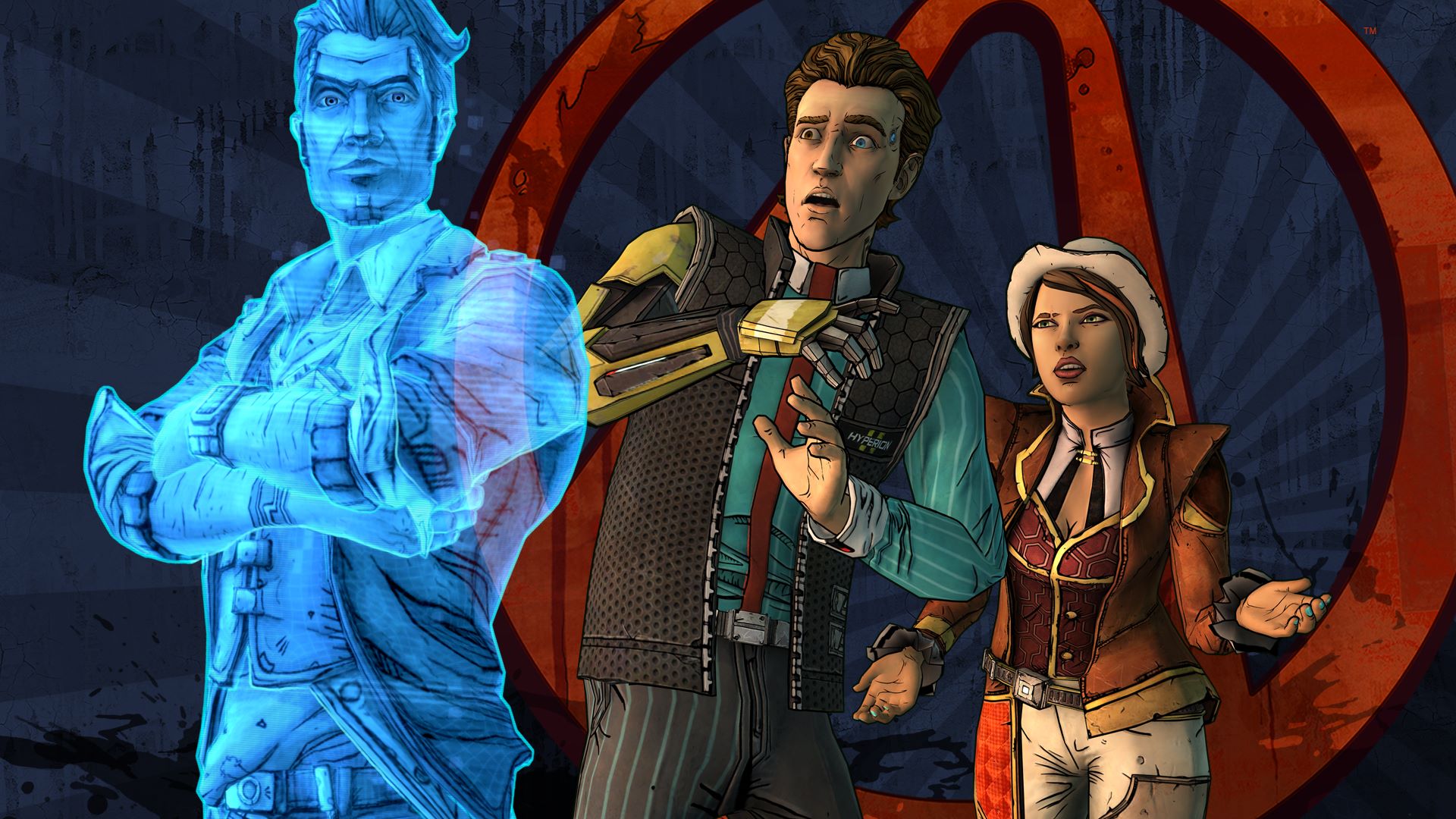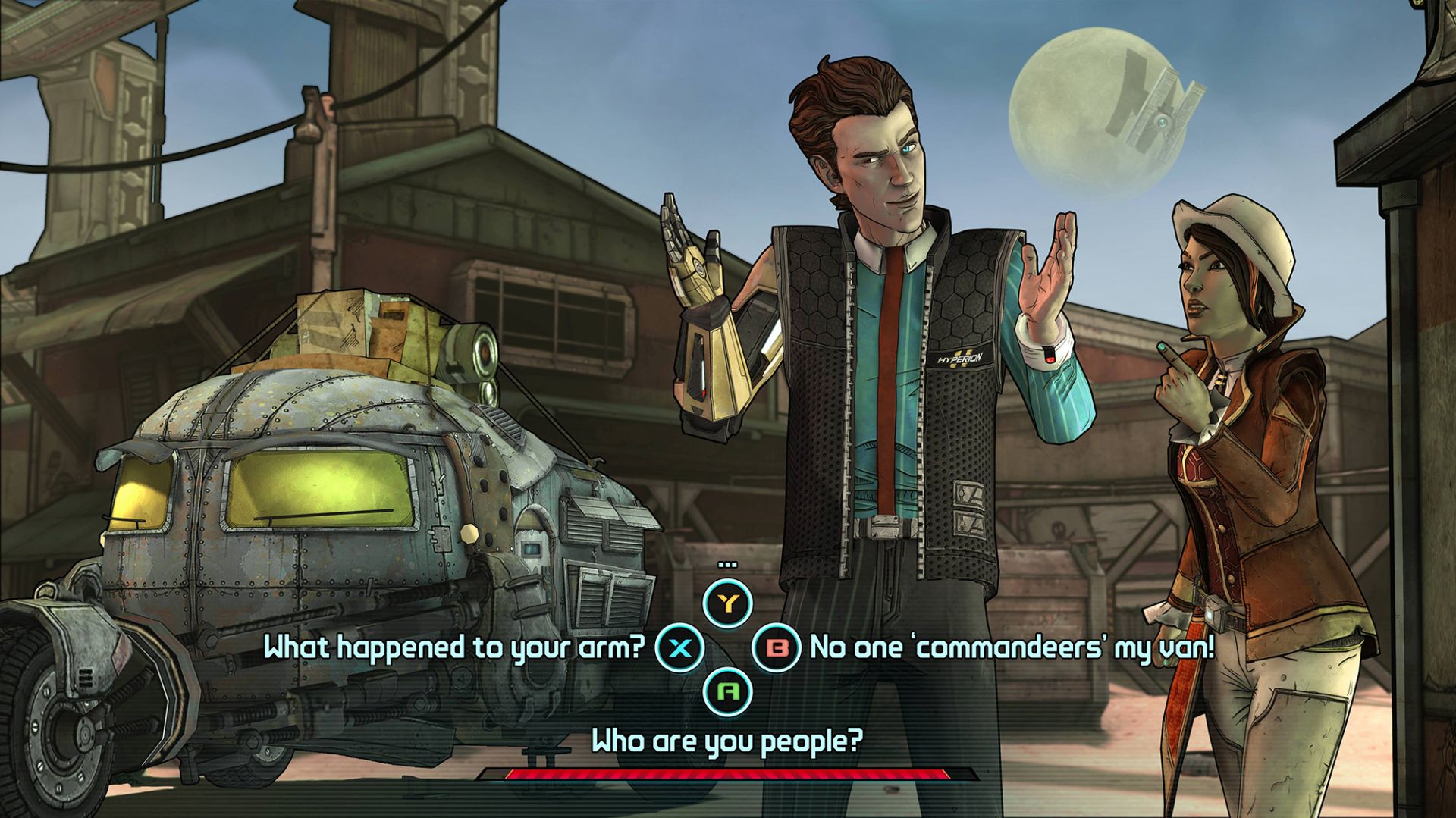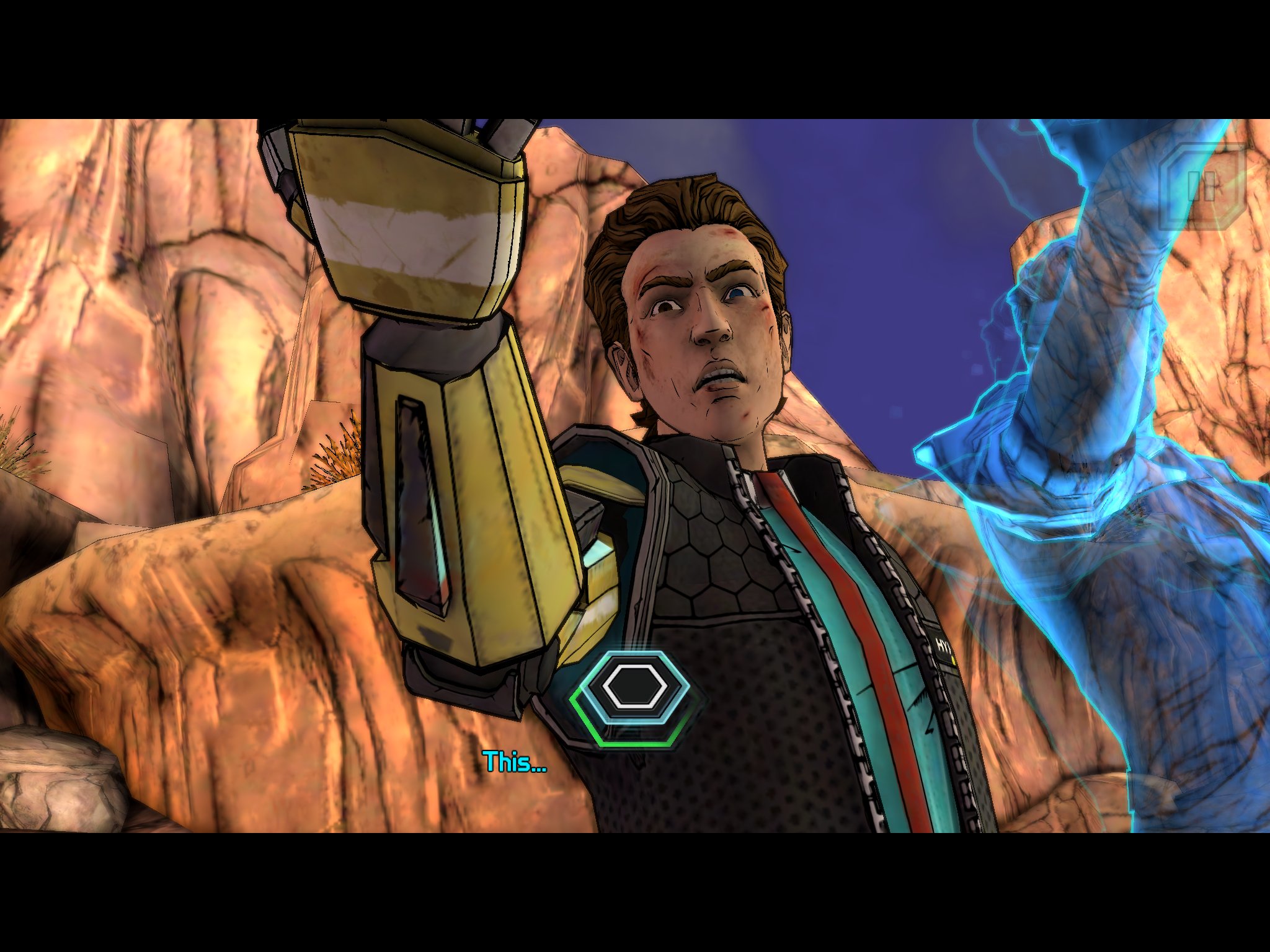[Tales from the Borderlands - Episode 2: Atlas Mugged, Telltale Games, 2K Games, 2015]
The Art of the Cliffhanger
Ah, the lost narrative style of the cliffhanger. I have only just started with Telltale's Game of Thrones series and while Walking Dead is on my playlist, it hasn't made it to my hard drive yet, so I can't tell you if all of their titles contain this type of plot device, but through the first two episodes, it appears to be a staple of the Tales from the Borderlands series. Just as Episode 1 left players with their jaws in their laps, Episode 2 has a similar, "What the frack?" ending that serves to deftly re-employ the ancient, somewhat lost art of the cliffhanger.
L'Histoire
<Episode 1 Spoiler Alert>
When we last left Ryhs and Fiona, they were trying to get away from Vasquez, Rhys' Hyperion nemesis, fittingly-voiced by Patrick Warburton of David Putty (Seinfeld) fame. Warburton does a fabulous job of playing the part of the scummy, yet somehow amiable corporate ladder-climber who keeps crushing Rhys' dreams of a bigger and better future. Much like his counterpart on the long-running sitcom, while you wouldn't ever want to be seen in public with Vasquez for fear he would say something awful and put everyone in earshot in a state of extreme discomfort, you can't help but enjoy the completeness of the character's persona.
Anyway, Rhys (and his sidekick Vaughn) and Fiona (plus her partner Sasha) manage to avoid Vasquez's attempts to corral and kill them and end up falling into the Gortys Project, a room full of Atlas tech introduced by the former Hyperion headman and current inhabitant of Rhys' brain, Handsome Jack. All of this takes place as a retelling by Rhys and Fiona to an unknown captor who is holding them hostage and forcing them to recount all the details they know about the mysterious Gortys Project. Some of the more fun parts of both episodes 1 and 2 take place when the two protagonists begin to argue about the details of the story. It also serves to remind the gamer that he is re-playing a story rather than experiencing it first-hand. It is an interesting plot device and one you don't see outside of literature very often, certainly not in video games.
<Spoiler Complete>
Episode 2
I will go into more detail about this episode in the upcoming review of Episode 3. I hate to spoil the fun for anyone who has yet to play it, but I don't like leaving out major plot-points for the sake of avoiding spoilers, either. I guess that's a prime reason the serial format lends itself to game reviews. By the time the newest episode has been released, you can pretty much assume that 90% of the people who were going to play the last episode have finished it already, so it's spoilers...AWAY!!! Until then, I will just give a brief synopsis while trying not to divulge too many details and stick to telling you what I think of the game.
Episode 2 finds Rhys still suffering with random appearances of his unwanted AI implant, Handsome Jack. Since Rhys is the only one that can see Jack, he's kind of like Jimmy Stewart stuck with the six-foot rabbit, Harvey, where everyone else believes he's either having some sort of psychotic break or just putting them on. If he could only convince the right people at Hyperion that Handsome Jack's intelligence continues to survive inside his head, it could be his ticket to Easy Street, but unfortunately he's on Pandora and the only people he can tell are his lackey friend Vaughn who is in even less of a position to do anything for him than Rhys himself, and Vasquez, who could care less if the presence of the Almighty himself was inhabiting Rhys' brain so long as he gets his vault key.
Again, I don't want to go into too much detail, but suffice it to say that Rhys, Fiona, their respective counterparts Vaughn and Sasha, and the ever-loyal Loader Bot who is always there to lend a hand continue on their quest to discover the meaning behind the Gortys Project and, hopefully, uncover a vault key in the process. They are hotly pursued by Vasquez and his lackeys who have all the ethical standards of a Ponzi scheme plotter. Also, this episode ends with an even greater cliffhanger than the first. Not only are you left wondering what's going to happen next, but what the heck just happened. It leaves you hanging with all the skill of the best Saturday morning serial from the movie theatre glory days of old.
The Mechanic's Shop
One place where this game both shines and leaves something to be desired is in the gameplay mechanics themselves. It's more of a "Choose Your Own Adventure" story that takes place in the Borderlands universe than an actual Borderlands game. You have to make dialogue decisions a la Mass Effect that change the way the story goes and can have series-long consequences for your protagonists. Not only that, but the dialogue choices are on a short timer, so you are extremely pressed for time and only given a few seconds to make a decision that could alter the entire game experience. That said, it's not an RPG, it's not an FPS, it's not a looter. Basically it lacks all of the components that made Borderlands so addictive and gave it virtually neverending replayability.
The only action, controller-wise, in the game is limited to a series of button-mashing commands, controller swipes, and the occasional matching of a hexagon with the indicated spot on-screen before you had to hit right trigger/R2. There are also small portions where Rhys uses his bionic eye to investigate the area, but the solutions are fairly obvious and present little in the way of a challenge. It's not like Borderlands required the complicated melange of button mastery needed to keep from getting constantly annihilated in Call of Duty: Advanced Warfare, what with its cryosuit boosts, slides, powers, grenades, and the like, but it certainly asked more of a player than smashing down on the X button until a green circle was filled in to keep the play continuing. This lack of anything but the simplest mechanics may be acceptable in the mobile gaming market, but for consoles with controllers boasting ten buttons and three directional controllers, it's just too simplistic.
I realize that these Telltale Games titles are available on mobile devices, as well, and maybe it was the cross-platform requirements that restricted the controller options on the XBox One, PC, and PS4. However, as a long-time Borderlands fan and addict, it has been somewhat of a letdown, albeit a minor one as the games contain the same brand of off-color humor that make the original and it's pre- and post-sequel some of this reviewer's favorite titles of the last generation. That said, I'll be honest, I'm looking for a little bit more in a Borderlands game. I guess I shouldn't complain given the price and the ability to return to Pandora one more time for just a few bucks. It's well worth the money for any fan of the series. I don't see Tales From The Borderlands bringing in many new fans, though. If you have a miniature ClapTrap sitting on your desk, then these are definitely for you. If you have no idea what I'm talking about, you should probably consider looking elsewhere, or just waiting for Elder Scrolls Online to finally hit consoles this summer...maybe.
The Math
Objective Score: 7/10
Bonuses: +1 for showing us a part of the Borderlands universe that was, as yet, unseen. So far, everything has been from the Vault Hunters' perspective. It's nice to see what an average Hyperion employee goes through.
Penalties: -1 for a control scheme that would leave one of the three buttons on a Sega Genesis controller mostly untouched, nevermind today's complex pieces of ergonomic artwork.
Nerd Coefficient: 7/10. A mostly enjoyable experience.
Read about our scoring system here.










